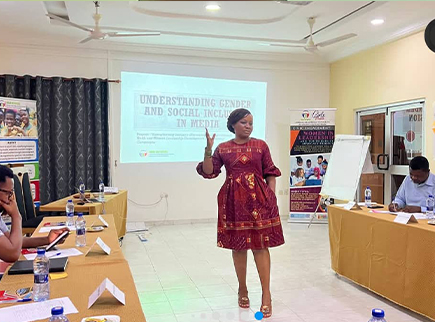Mrs Catherine Ama Nartey, a lawyer and child protection advocate, has called on media professionals to create a more inclusive media space to tackle abuses.
“Let’s build a media space that values every voice, she said.
Mrs Nartey emphasised the importance of giving a platform to marginalised voices, particularly women, youth and Persons with Disabilities to ensure representation of diverse views.
She also reiterated the need to encourage participation and representation of all groups, highlight and address issues affecting all person, hold leaders accountable to all constituents and empower marginalised groups to demand their rights, towards creating a more inclusive and equitable society.
Mrs Nartey made the call, while facilitating a two-day media training session on “Strengthening Inclusive Governance in Ghana through Youth and Women Leadership Development and Advocacy Campaigns” in Ho.
She underscored the power of the media, saying it went beyond shaping public discourse and influencing policy decisions.
Mrs Nartey shared a lived experience from how her aunt lost out completely on benefitting from a partner she co-habited with for decades following his death, to her own journey to becoming a lawyer.
“… In fact, a thought-provoking radio discussion influenced my decision to become a lawyer. I realised that if we had had access to such information earlier, my aunt would not have lost the house and everything she and her late partner worked to build. It’s a stark reminder of the media’s power to educate and empower communities.”
Mrs Nartey urged the media to practice gender-sensitive reporting, explaining that gender, a “socially constructed roles, behaviours, and attributes that society considers appropriate for men, women, and other gender identities” was actually about understanding and addressing the roles, expectations and experiences of all individuals, including men.
“It’s about promoting equality, respect and inclusivity for everyone,” she said.
The training, a project of Gender and Reproductive Advocacy Youth Network, a youth-led nonprofit organisation in Ghana was funded by the High Commission of Canada to Ghana, Togo and Sierra Leone, through the Canada Fund for Local Initiatives.
The training, which sought to strengthen the capacity of journalists to produce inclusive, ethical, and balanced media content that amplified women and youth voices in governance and civic participation, saw presentations on “Understanding Gender and Social Inclusion in Media”, “Identifying Gender Bias in Media Content” and “Principles of Ethical Governance Reporting” among others.
Some participants after the training told the Ghana News Agency in an interview that they felt equipped to “contribute to a more equitable media landscape.”

